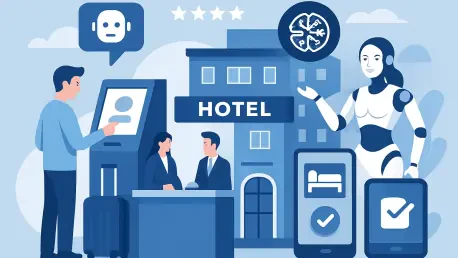I’m thrilled to sit down with Katarina Railko, a seasoned expert in the hospitality industry with a wealth of experience in travel and tourism. Katarina has honed her skills across various sectors, including entertainment and events, and is a prominent voice at expos and conferences. Today, we’re diving into the transformative trends shaping the global hotel industry, from the critical need for speed and connectivity to the growing role of AI and innovative technologies. Our conversation explores how these shifts are unlocking billions in potential revenue and redefining hotel operations for the future.
How do the latest survey findings highlight the revenue potential for hoteliers through better system integration?
The recent survey of 700 hoteliers worldwide paints a compelling picture. A significant 65% of them believe that faster, fully integrated systems could boost their annual revenue by at least 6%. When you consider the global accommodation sector is valued at $1.2 trillion, we’re talking about a potential opportunity worth billions. This isn’t just a number—it’s a wake-up call for the industry to prioritize seamless technology that lets hoteliers respond to market changes in real time, whether it’s adjusting rates based on competitor moves or capitalizing on sudden demand spikes.
Why has speed become such a pivotal factor for hoteliers in the past year?
Speed has always mattered, but our research shows that 93% of hoteliers now see it as more important than ever, with 58% calling it ‘business critical.’ The reason is simple: the market is moving faster. Guests expect instant booking confirmations, dynamic pricing reflects real-time demand, and competitors can undercut you in a heartbeat. If you’re not quick to adapt—whether it’s updating rates or securing bookings—you’re leaving money on the table. For many, this isn’t just a competitive edge; it’s about survival in a hyper-dynamic environment.
What are some specific challenges hoteliers face when they can’t respond quickly to market shifts?
When hoteliers can’t act fast, they miss out on key opportunities. Our survey found that 45% lose revenue weekly because of slow responses. Imagine a sudden surge in demand due to a local event or a new flight route— if your pricing isn’t updated instantly, you’re either overbooked at low rates or sitting empty while competitors snag the business. Operationally, slow systems mean staff are stuck manually adjusting reservations or pricing, which delays everything from guest service to strategic decision-making. It’s a domino effect that impacts both revenue and guest satisfaction.
How do manual processes continue to hinder hoteliers’ ability to stay competitive?
Manual processes are a major roadblock. The survey revealed that 36% of hoteliers update pricing only monthly or less, which is far too slow in today’s market where rates can fluctuate daily. On top of that, 79% spend over 11 hours a week on tasks that could be automated—think data entry, reservation updates, or reconciling bookings across platforms. This not only wastes time but pulls focus away from strategic priorities like marketing or guest experience enhancements. In a competitive landscape, being stuck in manual mode means you’re always playing catch-up.
What’s fueling the growing interest in AI solutions among hoteliers?
Nearly half of the hoteliers surveyed—49%—are actively seeking AI solutions, and it’s no surprise. AI offers a way to tackle the inefficiencies of manual work and make sense of complex data. Hoteliers are under pressure to optimize pricing, predict demand, and personalize guest interactions, and AI can process vast amounts of information—like historical booking trends or local market shifts—to provide actionable insights. Plus, with 43% open to AI-driven recommendations, there’s a clear appetite for tech that can guide decisions, especially as staffing shortages and time constraints persist.
How do you envision AI transforming day-to-day operations for hoteliers in the coming years?
AI is poised to be a game-changer. In the near future, I see it streamlining everything from pricing adjustments to guest communications. Imagine an AI engine that analyzes 130 million bookings and local demand data to suggest the perfect rate for a specific night—or even a specific guest segment. It could automate routine tasks like responding to inquiries or flagging maintenance issues based on guest feedback patterns. This frees up hoteliers to focus on creating memorable experiences rather than crunching numbers. It’s about working smarter, not harder, and I think we’re just scratching the surface of what’s possible.
Can you tell us more about the new connectivity capabilities designed to enhance real-time updates for hoteliers?
Absolutely. The industry is moving toward next-generation connectivity, which focuses on real-time, two-way updates between platforms like property management systems and revenue tools. This means pricing changes, restrictions, and reservations sync instantly, giving hoteliers unprecedented control over their strategies. For example, if a competitor drops their rates, you can adjust yours automatically and see the update reflected across all systems without manual input. It’s about eliminating lag and empowering properties to react as fast as the market does—turning insights into action in a matter of seconds.
What is your forecast for the role of technology in shaping the future of hotel revenue management?
I believe technology will be the backbone of hotel revenue management in the coming decade. We’re heading toward a future where seamless integration and AI-driven intelligence are not just nice-to-haves but essentials. Systems will become more intuitive, automating mundane tasks and providing hyper-localized insights that allow hoteliers to anticipate guest needs and market trends before they even emerge. The focus will shift from reacting to leading—hotels won’t just respond to demand; they’ll shape it. It’s an exciting time, and I think we’ll see a wave of innovation that redefines how the industry operates at every level.









